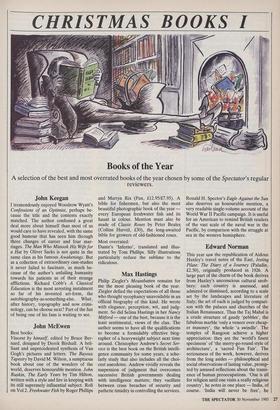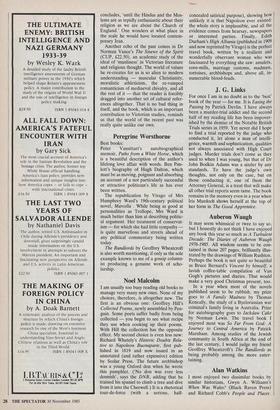Edward Norman
This year saw the republication of Aldous Huxley's travel notes of the East, Jesting Pilate: The Diary of a Journey (Paladin, £2.50), originally produced in 1926. A large part of the charm of the book derives from Huxley's unconscious cultural snob- bery: each country is assessed, and admired or dismissed, according to a scale set by the landscapes and literature of Italy; the art of each is judged by compari- son with the palaces and churches of the Italian Renaissance. Thus the Taj Mahal is a crude structure of gaudy 'pebbles', the fabulous marble 'only a veneer over cheap- er masonry', the whole 'a swindle'. The temples of Rangoon achieve a higher appreciation: they are the `world's finest specimens' of 'the merry-go-round style of architecture', a 'sacred Fun Fair'. The seriousness of the work, however, derives from the long asides — philosophical and social observations of lasting value, promp- ted by amused reflections about the transi- ence of human preoccupations. 'One is all for religion until one visits a really religious country', he notes in one place — India, of course. 'India will never be free', he concludes, 'until the Hindus and the Mos- lems are as tepidly enthusiastic about their religion as we are about the Church of England.' One wonders at what place in the scale he would have located contem- porary Iran.
Another echo of the past comes in Dr Norman Vance's The Sinews of the Spirit (CUP, £22.50), an academic study of the ideal of 'manliness' in Victorian literature and religious thought. The world of values he re-creates for us is so alien to modern understanding — muscular Christianity, moralistic athleticism, the re-vamped romanticism of mediaeval chivalry, and all the rest of it — that the reader is forcibly dragged into another set of cultural refer- ences altogether. That is no bad thing in itself, and the book, which is an important contribution to Victorian studies, reminds us that the world of the recent past was really quite unlike our own.



























































 Previous page
Previous page